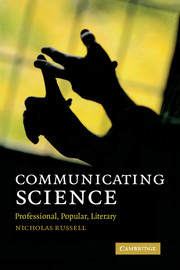Book contents
- Frontmatter
- Contents
- Introduction: What this book is about and why you might want to read it
- Prologue: Three orphans share a common paternity: professional science communication, popular journalism and literary fiction are not as separate as they seem
- Part I Professional science communication
- Part II Science for the public: what science do people need and how might they get it?
- Part III Popular science communication: the press and broadcasting
- Part IV The origins of science in cultural context: five historic dramas
- 15 A terrible storm in Wittenberg: natural knowledge through sorcery and evil
- 16 A terrible storm in the Mediterranean: controlling nature with white magic and religion
- 17 Thieving magpies: the subtle art of false projecting
- 18 Foolish virtuosi: natural philosophy emerges as a discipline but many cannot take it seriously
- 19 Is scientific knowledge ‘true’ or should it just be ‘truthfully’ deployed?
- Part V Science in literature
- Index
- References
16 - A terrible storm in the Mediterranean: controlling nature with white magic and religion
Published online by Cambridge University Press: 02 December 2010
- Frontmatter
- Contents
- Introduction: What this book is about and why you might want to read it
- Prologue: Three orphans share a common paternity: professional science communication, popular journalism and literary fiction are not as separate as they seem
- Part I Professional science communication
- Part II Science for the public: what science do people need and how might they get it?
- Part III Popular science communication: the press and broadcasting
- Part IV The origins of science in cultural context: five historic dramas
- 15 A terrible storm in Wittenberg: natural knowledge through sorcery and evil
- 16 A terrible storm in the Mediterranean: controlling nature with white magic and religion
- 17 Thieving magpies: the subtle art of false projecting
- 18 Foolish virtuosi: natural philosophy emerges as a discipline but many cannot take it seriously
- 19 Is scientific knowledge ‘true’ or should it just be ‘truthfully’ deployed?
- Part V Science in literature
- Index
- References
Summary
Once upon a time a Witch of considerable power lived on a mythical island in the Southern Mediterranean. In stereotypical fashion she coupled with the Devil to produce a monstrous offspring whose hideous appearance reflected his evil personality. She also had a familiar spirit to do her bidding. Angry with this spirit she trapped him in a cleft pine tree and left him there, dying before she thought to release him.
The spirit was saved by a Wizard arriving on the island with his little daughter. Using his magical powers the Wizard freed the spirit and enslaved the Witch's misshapen offspring. The spirit undertook the Wizard's morally good bidding but the deformed child remained evil. To work his magic, the Wizard put on a magical coat, used a magic wand, stood within circles inscribed on the ground, and used incantations to summon the spirit.
The Wizard used his powers to right past injustices. He had been a Duke but, obsessed with occult study, passed the rule of his Dukedom to his brother. That brother, in cahoots with the King to which the Dukedom was vassal, usurped the Dukedom and would have killed the brother and little daughter had not a kindly counsellor intervened with the scheme for casting them adrift. Years later the exiled Wizard was able to bring his brother, the King, and their retinues into his power when they sailed close to his island. The Wizard conjured up a storm which wrecked the ship and cast the nobles ashore. […]
- Type
- Chapter
- Information
- Communicating ScienceProfessional, Popular, Literary, pp. 214 - 218Publisher: Cambridge University PressPrint publication year: 2009



